- Home
- Louisa May Alcott
An Old-Fashioned Girl Page 24
An Old-Fashioned Girl Read online
Page 24
"Can't do it."
"Well, go on, then. Are you truly expelled? Can't it be made up? What did you do?"
"It 's a true bill this time. I just had a row with the Chapel watchman, and knocked him down. If it was a first offence, I might have got off; but you see I 've had no end of narrow escapes, and this was my last chance; I 've lost it, and now there 'll be the dickens to pay. I knew it was all up with me, so I did n't wait to be turned out, but just took myself off."
"What will your father say?"
"It will come hard on the governor, but the worst of it is " there Tom stopped, and stood a minute in the middle of the room with his head down, as if he did n't find it easy to tell even kind little Polly. Then out came the truth all in a breath, just as he used to bolt out his boyish misdemeanors, and then back up against the wall ready to take the consequences.
"I owe an awful lot of money that the governor don't know about."
"Oh, Tom, how could you?"
"I 've been an extravagant rascal, I know it, and I 'm thundering sorry, but that don't help a fellow, I 've got to tell the dear old buffer, and there 's where it cuts."
At another time Polly would have laughed at the contrast between Tom's face and his language, but there was a sincere remorse, which made even the dreadful word "buffer"
rather touching than otherwise.
"He will be very angry, I dare say; but he 'll help you, won't he? He always does, Fan says."
"That 's the worst of it, you see. He 's paid up so often, that the last time he said his patience could n't stand it, nor his pocket either, and if I got into any more scrapes of that sort, I must get out as I could. I meant to be as steady as Bunker Hill Monument; but here I am again, worse than ever, for last quarter I did n't say anything to father, he was so bothered by the loss of those ships just then, so things have mounted up confoundedly."
"What have you done with all your money?"
"Hanged if I know."
"Can't you pay it anyway?"
"Don't see how, as I have n't a cent of my own, and no way of getting it, unless I try gambling."
"Oh, mercy, no! Sell your horse," cried Polly, after a minute of deep meditation.
"I have; but he did n't bring half I gave for him. I lamed him last winter, and the beggar won't get over it."
"And that did n't pay up the debts?"
"Only about a half of 'em."
"Why, Tom, how much do you owe?"
"I have dodged figuring it up till yesterday; then things were so desperate, I thought I might as well face the truth, so I overhauled my accounts, and there 's the result."
Tom threw a blotted, crumpled paper into Polly's lap, and tramped up and down again, faster than ever. Polly took one look at the total and clasped her hands, for to her inexperienced eyes it looked appalling.
"Tidy little sum, is n't it?" asked Tom, who could n't bear the silence, or the startled, grieved look in Polly's eyes.
"It 's awful! I don't wonder you dread telling your father."
"I 'd rather be shot. I say, Polly, suppose we break it to him easy!" added Tom, after another turn.
"How do you mean?"
"Why, suppose Fan, or, better still, you go and sort of pave the way. I can't bear to come down on him with the whole truth at once."
"So you 'd like to have me go and tell him for you?" Polly's lip curled a little as she said that, and she gave Tom a look that would have shown him how blue eyes can flash, if he had seen it. But he was at the window, and did n't turn, as he said slowly, "Well, you see, he 's so fond of you; we all confide in you; and you are so like one of the family, that it seems quite natural. Just tell him I 'm expelled, you know, and as much more as you like; then I 'll come in, and we 'll have it out."
Polly rose and went to the door without a word. In doing so, Tom caught a glimpse of her face, and said, hastily, "Don't you think it would be a good plan?"
"No, I don't."
"Why not? Don't you think he 'd rather have it told him nicely by you, than blurted out as I always do blurt things?"
"I know he 'd rather have his son go to him and tell the truth, like a man, instead of sending a girl to do what he is afraid to do himself."
If Polly had suddenly boxed his ears, Tom could n't have looked more taken aback than by that burst. He looked at her excited face, seemed to understand the meaning of it, and remembered all at once that he was trying to hide behind a girl. He turned scarlet, said shortly, "Come back, Polly," and walked straight out of the room, looking as if going to instant execution, for poor Tom had been taught to fear his father, and had not entirely outgrown the dread.
Polly sat down, looking both satisfied and troubled. "I hope I did right," she said to herself, "I could n't bear to have him shirk and seem cowardly. He is n't, only he did n't think how it seemed to me, and I don't wonder he was a little afraid, Mr. Shaw is so severe with the poor fellow. Oh, dear, what should we do if Will got into such scrapes.
Thank goodness, he 's poor, and can't; I 'm so glad of that!"
Then she sat silent beside the half-open door, hearing the murmur of Tom's voice across the hall, and hoping, with all her heart, that he would n't have a very hard time.
He seemed to tell his story rapidly and steadily, without interruption, to the end; then Polly heard Mr. Shaw's deeper voice say a few words, at which Tom uttered a loud exclamation, as if taken by surprise. Polly could n't distinguish a word, so she kept her seat, wondering anxiously what was going on between the two men. A sudden pause seemed to follow Tom's ejaculation, then Mr. Shaw talked a long time in a low, earnest tone, so different from the angry one Polly had expected to hear, that it made her nervous, for Mr. Shaw usually "blew Tom up first, and forgave him afterward," as Maud said. Presently Tom's voice was heard, apparently asking eager questions, to which brief replies were given. Then a dead silence fell upon the room, and nothing was heard but the spring rain softly falling out of doors. All of a sudden she heard a movement, and Tom's voice say audibly, "Let me bring Polly;" and he appeared, looking so pale and miserable that Polly was frightened.
"Go and say something to him; I can't; poor old father, if I 'd only known," and to Polly's utter dismay, Tom threw himself into a chair, and laid his head down on the table, as if he had got a blow that was too much for him.
"Oh, Tom, what is it?" cried Polly, hurrying to him, full of fears she dared not speak.
Without looking up, Tom answered, in a smothered voice, "Failed; all gone to smash; and to-morrow every one will know it."
Polly held on to the back of Tom's chair, for a minute, for the news took her breath away, and she felt as if the world was coming to an end, "failed" was such a vaguely dreadful word to her.
"Is it very bad?" she asked, softly, feeling as if anything was better than to stand still and see Tom so wretched.
"Yes; he means to give up everything. He 's done his best; but it can't be staved off any longer, and it 's all up with him."
"Oh, I wish I had a million to give him!" cried Polly, clasping her hands, with the tears running down her cheeks. "How does he bear it, Tom?"
"Like a man, Polly; and I 'm proud of him," said Tom, looking up, all red and excited with the emotions he was trying to keep under. "Everything has been against him, and he has fought all alone to stand the pressure, but it 's too much for him, and he 's given in.
It 's an honorable failure, mind you, and no one can say a word against him. I 'd like to see 'em try it!" and Tom clenched his hands, as if it would be an immense relief to him to thrash half a dozen aspersers of his father's honest name.
"Of course they can't! This is what poor Maud troubled about. He had told your mother and Fan before you came, and that is why they are so unhappy, I suppose."
"They are safe enough. Father has n't touched mother's money; he 'could n't rob his girls,' he said, and that 's all safe for 'em. Is n't he a trump, Polly?" And Tom's face shone with pride, even while his lips would twitch with a tenderer feeling.
"You can. Go and be good to him; you know how; he needs it enough, all alone there. I can't do it, for I 'm only a curse instead of a comfort to him."
"How did he take your news?" asked Polly, who, for a time, had forgotten the lesser trouble in the greater.
"Like a lamb; for when I 'd done, he only said, 'My poor lad, we must bear with one another.' and then told his story."
"I 'm glad he was kind," began Polly, in a soothing tone; but Tom cried out, remorsefully,
"That 's what knocks me over! Just when I ought to be a pride and a prop to him, I bring him my debts and disgrace, and he never says a word of blame. It 's no use, I can't stand it!" and Tom's head went down again with something very like a sob, that would come in spite of manful efforts to keep it back, for the poor fellow had the warmest heart that ever was, and all the fine waistcoats outside could n't spoil it.
That sound gave Polly more pain than the news of a dozen failures and expulsions, and it was as impossible for her to resist putting her hand tenderly on the bent head, as it was for her to help noticing with pleasure how brown the little curls were growing, and how soft they were. In spite of her sorrow, she enjoyed that minute very much, for she was a born consoler, and, it is hardly necessary for me to add, loved this reprehensible Tom with all her heart. It was a very foolish thing for her to do, she quite agreed to that; she could n't understand it, explain it, or help it; she only felt that she did care for him very much, in spite of his faults, his indifference, and his engagement. You see, she learned to love him one summer, when he made them a visit. That was before Trix caught him; and when she heard that piece of news, Polly could n't unlove him all at once, though she tried very hard, as was her duty. That engagement was such a farce, that she never had much faith in it, so she put her love away in a corner of her heart, and tried to forget it, hoping it would either die, or have a right to live. It did n't make her very miserable, because patience, work, and common-sense lent her a hand, and hope would keep popping up its bright face from the bottom of her Pandora-box of troubles.
Now and then, when any one said Trix would n't jilt Tom, or that Tom did care for Trix more than he should, Polly had a pang, and thought she could n't possibly bear it. But she always found she could, and so came to the conclusion that it was a merciful provision of nature that girls' hearts could stand so much, and their appetites continue good, when unrequited love was starving.
Now, she could not help yearning over this faulty, well-beloved scapegrace Tom, or help thinking, with a little thrill of hope, "If Trix only cared for his money, she may cast him off now he 's lost it; but I 'll love him all the better because he 's poor." With this feeling warm at her heart, I don't wonder that Polly's hand had a soothing effect, and that after a heave or two, Tom's shoulders were quiet, and certain smothered sniffs suggested that he would be all right again, if he could only wipe his eyes without any one's seeing him do it.
Polly seemed to divine his wish, and tucking a little, clean handkerchief into one of his half-open hands, she said, "I 'm going to your father, now," and with a farewell smooth, so comforting that Tom wished she 'd do it again, she went away.
As she paused a minute in the hall to steady herself, Maud called her from above, and thinking that the women might need her more than the men, she ran up to find Fanny waiting for her in her own room.
"Mamma's asleep, quite worn out, poor dear, so we can talk in here without troubling her," said Fanny, receiving her friend so quietly, that Polly was amazed.
"Let me come, too, I won't make any fuss; it 's so dreadful to be shut out everywhere, and have people crying and talking, and locked up, and I not know what it means," said Maud, beseechingly.
"You do know, now; I 've told her, Polly," said Fan, as they sat down together, and Maud perched herself on the bed, so that she might retire among the pillows if her feelings were too much for her.
"I 'm glad you take it so well, dear; I was afraid it might upset you," said Polly, seeing now that in spite of her quiet manner, Fan's eyes had an excited look, and her cheeks a feverish color.
"I shall groan and moan by and by, I dare say, but at first it sort of dazed me, and now it begins to excite me. I ought to be full of sorrow for poor papa, and I am truly sorry, but, wicked as it may seem, it 's a fact, Polly, that I 'm half glad it 's happened, for it takes me out of myself, and gives me something to do."
Fanny's eyes fell and her color rose as she spoke, but Polly understood why she wanted to forget herself, and put her arm round her with a more tender sympathy than Fanny guessed.
"Perhaps things are not as bad as they seem; I don't know much about such matters, but I 've seen people who have failed, and they seemed just as comfortable as before,"
said Polly.
"It won't be so with us, for papa means to give up everything, and not have a word said against him. Mamma's little property is settled upon her, and has n't been risked. That touched her so much! She dreads poverty even more than I do, but she begged him to take it if it would help him. That pleased him, but he said nothing would induce him to do it, for it would n't help much, and was hardly enough to keep her comfortable."
"Do you know what he means to do?" asked Polly, anxiously.
"He said his plans were not made, but he meant to go into the little house that belonged to grandma, as soon as he could, for it was n't honest for a bankrupt to keep up an establishment like this."
"I shan't mind that at all, I like the little house 'cause it 's got a garden, and there 's a cunning room with a three-cornered closet in it that I always wanted. If that 's all, I don't think bankrupting is so very bad," said Maud, taking a cheerful view of things.
"Ah, just wait till the carriage goes and the nice clothes and the servants, and we have to scratch along as we can. You 'll change your mind then, poor child," said Fanny, whose ideas of failure were decidedly tragical.
"Will they take all my things away?" cried Maud, in dismay.
"I dare say; I don't know what we are allowed to keep; but not much, I fancy," and Fan looked as if strung up to sacrifice everything she possessed.
"They shan't have my new ear-rings, I 'll hide 'em, and my best dress, and my gold smelling bottle. Oh, oh, oh! I think it 's mean to take a little girl's things away!" And Maud dived among the pillows to smother a wail of anguish at the prospect of being bereft of her treasures.
Polly soon lured her out again, by assurances that she would n't be utterly despoiled, and promises to try and soften the hard hearts of her father's creditors, if the ear-rings and the smelling-bottle were attached.
"I wonder if we shall be able to keep one servant, just till we learn how to do the work,"
said Fanny, looking at her white hands, with a sigh.
But Maud clapped hers, and gave a joyful bounce, as she cried, "Now I can learn to cook! I love so to beat eggs! I 'll have an apron, with a bib to it, like Polly's, and a feather duster, and sweep the stairs, maybe, with my head tied up, like Katy. Oh, what fun!"
"Don't laugh at her, or discourage her; let her find comfort in bibs and dust-pans, if she can," whispered Polly to Fan, while Maud took a joyful "header" among the pillows, and came up smiling and blowzy, for she loved house-work, and often got lectured for stolen visits to the kitchen, and surreptitious sweepings and dustings when the coast was clear.
"Mamma is so feeble, I shall have to keep house, I suppose, and you must show me how, Polly," said Fan.
"Good practice, ma'am, as you 'll find out some day," answered Polly, laughing significantly.
Fanny smiled, then grew both grave and sad. "This changes everything; the old set will drop me, as we did the Mertons when their father failed, and my 'prospects,' as we say, are quite ruined."
"I don't believe it; your real friends won't drop you, and you 'll find out which the true ones are now. I know one friend who will be kinder than ever."
"Oh, Polly, do you think so?" and Fanny's eyes softened with sudden tears.
"I know who she means," cried Maud, always eager to find out things. "It 's herself; Polly won't mind if we are poor, 'cause she likes beggars."
"Is that who you meant?" asked Fan, wistfully.
"No, it 's a much better and dearer friend than I am," said Polly, pinching Fanny's cheek, as it reddened prettily under her eyes. "You 'll never guess, Maud, so I would n't try, but be planning what you will put in your cunning, three-cornered closet, when you get it."
Having got rid of "Miss Paulina Pry," as Tom called Maud, who was immediately absorbed by her cupboard, the older girls soberly discussed the sudden change which had come, and Polly was surprised to see what unexpected strength and sense Fanny showed. Polly was too unconscious of the change which love had made in herself to understand at first the cause of her friend's new patience and fortitude; but she rejoiced over it, and felt that her prophecy would yet be fulfilled. Presently Maud emerged from her new closet, bringing a somewhat startling idea with her.
"Do bankrupting men" (Maud liked that new word) "always have fits?"
"Mercy, no! What put that into your head, child?" cried Polly.
"Why, Mr. Merton did; and I was thinking perhaps papa had got one down there, and it kind of frightened me."
"Mr. Merton's was a bad, disgraceful failure, and I don't wonder he had a fit. Ours is n't, and papa won't do anything of that sort, you may be sure," said Fanny, with as proud an air as if "our failure" was rather an honor than otherwise.
"Don't you think you and Maud had better go down and see him?" asked Polly.
"Perhaps he would n't like it; and I don't know what to say, either," began Fan; but Polly said, eagerly, "I know he would like it. Never mind what you say; just go, and show him that you don't doubt or blame him for this, but love him all the more, and are ready and glad to help him bear the trouble."
"I 'm going, I ain't afraid; I 'll just hug him, and say I 'm ever so glad we are going to the little house," cried Maud, scrambling off the bed, and running down stairs.

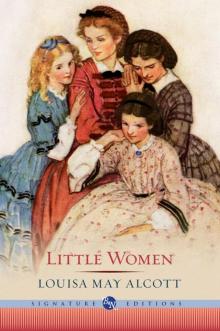 Little Women
Little Women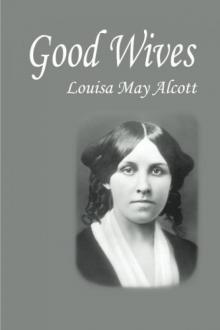 Good Wives
Good Wives Jo's Boys
Jo's Boys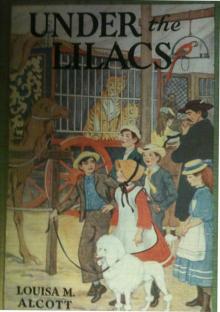 Under the Lilacs
Under the Lilacs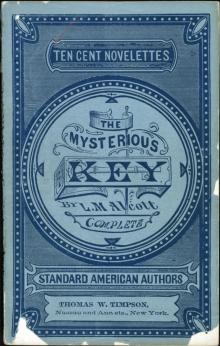 The Mysterious Key and What It Opened
The Mysterious Key and What It Opened The Inheritance
The Inheritance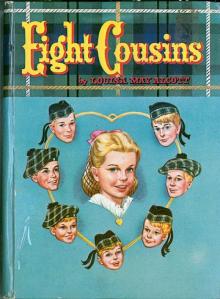 Eight Cousins
Eight Cousins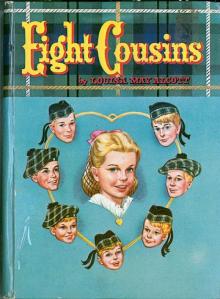 Eight Cousins; Or, The Aunt-Hill
Eight Cousins; Or, The Aunt-Hill Marjorie's Three Gifts
Marjorie's Three Gifts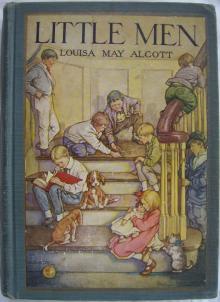 Little Men
Little Men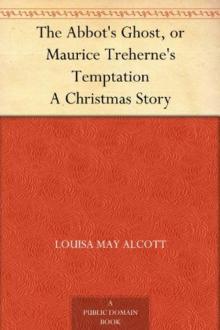 The Abbot's Ghost, or Maurice Treherne's Temptation: A Christmas Story
The Abbot's Ghost, or Maurice Treherne's Temptation: A Christmas Story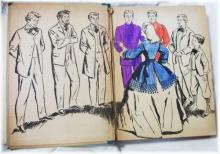 Rose in Bloom
Rose in Bloom Shawl-Straps
Shawl-Straps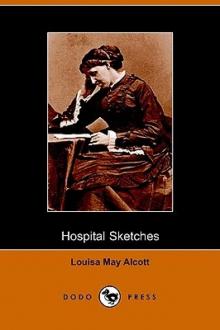 Hospital Sketches
Hospital Sketches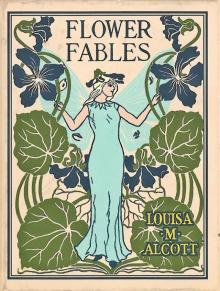 Flower Fables
Flower Fables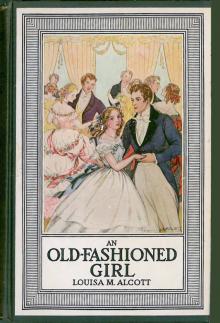 An Old-Fashioned Girl
An Old-Fashioned Girl The Candy Country
The Candy Country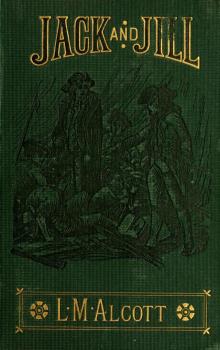 Jack and Jill
Jack and Jill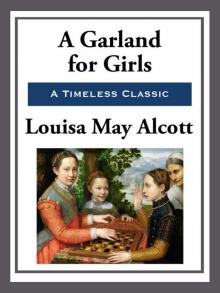 A Garland for Girls
A Garland for Girls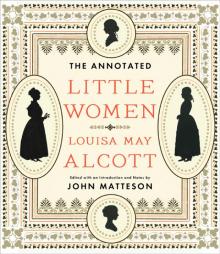 The Annotated Little Women
The Annotated Little Women A Classic Christmas
A Classic Christmas A Merry Christmas
A Merry Christmas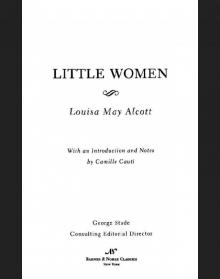 Little Women (Barnes & Noble Classics Series)
Little Women (Barnes & Noble Classics Series)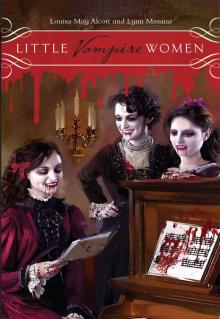 Little Vampire Women
Little Vampire Women